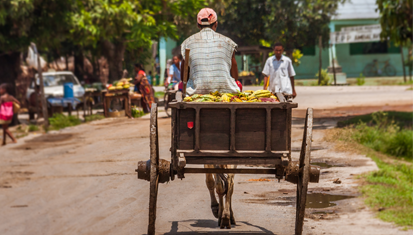The economic implications of Covid-19 the role of development capital
The economic implications of Covid-19 the role of development capital
The Covid-19 pandemic has provoked a global economic crisis that has highlighted the fragility of many jobs, markets, and livelihoods around the globe. In Sub-Saharan Africa, the limited capacity of health systems and the fiscal and budgetary capacity to respond and support the recovery phase pose significant challenges.
The economic effects of suspending almost all activity during lockdowns and the disruption in supply chains have immediately impacted the world’s commodity markets and resulted in a sharp contraction of demand for goods and services, supply disruptions, loss of revenues for many economic sectors, and loss of employment. The sharp decline in remittances is having an immediate impact on the livelihoods of the poor as remitters lose their income and are unable to send money. The decline in tourism and reversal of capital flows is also having a strong impact on LMICs. Loan repayments will also put microfinance lenders and risk as they may struggle to remain solvent which would result in decreased access to financial support for the poorest.
These short-term economic impacts can translate into reductions in long-term growth. The challenges faced in low- and middle-income countries has exacerbated the vulnerability of people living in poverty to other potential shocks. A working paper by Andy Sumner, Chris Hoy and Eduardo Ortiz-Juarez estimates that Covid-19 could increase global poverty for the first time since 1990 and represent a reversal of approximately a decade in the world’s progress in reducing it. In Sub-Saharan Africa, a World Bank brief using a comprehensive database of surveys from 45 of 48 SSA countries to examine the effects of the project fall in growth on poverty in the region estimates an additional 26 million people in SSA may fall into extreme poverty.
For those working in the informal economy, a lack of institutionalised sick leave and limited access to government relief efforts poses a trade-off between financial survival and health. In 2020, over 2 billion workers are earning their livelihoods in the informal economy, 90 per cent of total employment in low-income countries. The ILO considers some likely consequences of lockdown will include a loss in revenue for informal enterprises and an expansion of the informal economy following the closure of formal micro and small and medium-sized enterprises leading to an increase in unemployment.
Ecorys’ Policy and Research Unit has experience in providing research and evaluation to development finance institutions to improve their approach to low-income and fragile states and are currently working with partners and clients to support relevant programmes with their Covid-19 response.
The response from national governments and the international community falls into three phases. We are currently in the rescue phase focusing on basic services, health care and social protection. However, many international actors are already thinking of what their role can be in the recovery and transformation phase.
The recovery phase must be characterised by strong and sustainable investment paired with non-financial support to protect the world from a great depression. Some international actors see this as an opportunity to increase the focus on resilience and climate change. Recovery packages should focus on boosting demand and employment in the short term, while increasing productivity and competitiveness in the medium term, and bring about the transformation needed for inclusive, sustainable, and resilient growth. A response that does not address the sustainability of welfare systems and social protection in the long run is a missed opportunity.
To finance the recovery, development capital has a key role to play in providing patient and flexible capital at scale where financial systems might contract. With increasing interest rates and rising risk premiums in financial systems, development capital can contribute to manage these premiums and risks and ensuring the most vulnerable are not further excluded. it has been argued that development finance institutions often lack the flexibility needed for a crisis. At the moment, these organisations are supporting existing partners by either augmenting or extending lending and are aiming to adapt rapidly to the needs of their investees. In the longer term, development banks and development finance institutions can play a vital role in helping to take investments to scale and in catalysing private finance to support a more inclusive recovery.
There are more than 400 development banks operating on a national, regional, or global with combined assets of more than $11 trillion and would not require immediate additional resource contributions from shareholders to increase lending. They are also particularly well placed in bringing the public and private sector together, with experience working with both.
Focusing on providing a rapid response, the IMF has a Rapid Credit Facility and Rapid Financing Instrument that provide emergency financial assistance to member countries. The IMF, the World Bank and others have supported the suspension of repayment of official bilateral credit, although debt forgiveness is not a part of the equation yet. The World Bank is also using its already approved programmes to provide budget support. Note that the World Bank data portal allows to filter their programmes based on whether they have a Covid-19 response component. The African Development Bank has raised $3 billion in a three-year bond to help alleviate the economic and social impact the Covid-19 pandemic in Africa.
The Development Finance Institutions (DFIs) of 16 OECD countries, grouped under the DFI Alliance, issued a joint statement to announce that through enhanced cooperation and the leveraging of pooled resources, they will focus on reducing the impact of Covid-19 on essential business activities in these countries to help resolve current liquidity issues in financial sectors, support the viability of existing companies impacted by the virus, to finance the local private sector response to the health crisis with the goal of speeding recovery and promote new investment in goods and services necessary to global health, safety, and economic sustainability.
We do not know how long this crisis will last, but the risks to reversing decades of progress in sustainable development are very tangible. Collective solidarity and mobilisation are requisite to overcome this crisis.

11 June 2020
5 minute read


